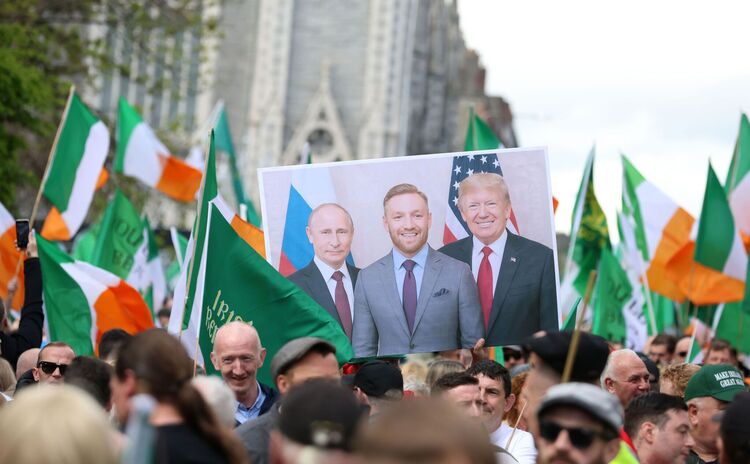[caption id="attachment_67552" align="aligncenter" width="600" caption="Dublin has its own version of Occupy Wall Street dubbed "Occupy Same Street." the protest includes an encampment outside Ireland's Central Bank."]
When I returned from Ireland in the spring of 2010, at what seemed like the height of revelations about the collapsing Irish economy and the misbehavior of some Roman Catholic clergy and institutions, I wrote a piece in this space commenting on the palpable anger in the streets of Dublin. Why, I asked, was there no similar outpouring in the United States?
I was off by about 18 months.
Say what you will about the Occupy Wall Street movement - it's not everybody's cup of tea party - but
there's no mistaking the anger. From the sleep-over at Zuccotti Park in lower Manhattan to the protests in business districts throughout the country, there's no avoiding the evident outrage and frustration.
Yes, there are some psychos attached to the movement. My least favorite are the 9/11 conspiracy theorists
who have managed to take attention away from the real issues at stake.
Any large group of human beings, however, is bound to contain a small share of nut jobs. The Tea Party has them (they're the ones who still think Barack Obama is an alien from another nation).
The American Revolution had them - have you ever read Thomas Paine's famous broadside, "Common Sense,"
in its entirety? As the great historian Thomas Fleming recently pointed out, Paine knew nothing about economics, but that didn't stop him from making grand statements about British commerce in the last third of his otherwise stirring pamphlet.
So those who wish to write off the Occupy Wall Street crowd because of the ravings of a few are no different from those who tried to write off the Tea Party because some (OK, maybe more than some) really believe that Barack Obama's mom figured out how to beat the Constitution and get her son elected president.
Either way, critics are trying to use the provocative statements of a few to discredit the movement's larger points.
And what, precisely, are those points? It's not always easy to figure out, just as I had trouble discerning what those angry demonstrators in Dublin wanted back in April of 2010. Neither the Dubliners nor the occupiers seemed/seem to have a coherent ideology, or an agreed-upon formula to right the wrongs which offend them.
That's OK, because these protests really are not designed to advocate specific policy positions. Back in
the 1960s, there was no mistaking the message of those who marched against the Vietnam War, or who risked their lives for the right to vote and to be treated with justice and respect.
Those protests also had their fringe element, and they attracted figures whose inflammatory positions probably hurt their cause. Dr. Martin Luther King Jr. had to contend with those who tried to associate him with radicals like Malcolm X and Stokely Carmichael. Legitimate critics of the Vietnam War were lumped together with groups like the Weathermen, who sought to inflict terrorism on U.S. cities.
It's happening again, but at a much less-volatile level. Neither the Tea Party nor the Occupy movements has produced a figure quite like Carmichael or the Weathermen and let's hope it remains so.
In Ireland, the backlash against authority is far angrier and far deeper than either protest movement here in the United States. This has nothing to do with ideology, even if Ireland has a genuine if small socialist Occupy Wall Street crowd and even, yes, the Tea Party protesters might find they have lots in common with the Irish on the subject of banks, economic inequality, and a lack of accountability.
But in Ireland, of course, the financial and political scandals exist side by side with the appalling failures of the Catholic Church, an institution which has no comparable place in American society.
The church's scandals, however, are of a different magnitude, which is why the bishops had better heed the warnings of Boston's Cardinal Sean O'Malley, who predicted that the Irish church would revert to a mere cult in ten years if steps are not taken, now, to make amends of past failures.
The church depends on the voluntary participation of its communicants. If they chose to punish the church, they can do so. They can stop going to Mass, they can let the collection plate pass by.
These sorts of remedies are unavailable to those who feel betrayed by banks and politicians on either side of the Atlantic. They can't withhold payments to the government, as they can to the church. They can't simply stop being a citizen in the way they can stop being a churchgoer.
So they are left with little choice but to protest, to make sure that decision-makers know that promises have been broken, futures clouded, prospects ruined, because of forces beyond the control of the average citizen. It doesn't matter, in a way, whether the protesters believe more government spending is necessary, or whether they are convinced that government is hampering job creation and economic growth.
What matters is that people are willing to expend the time, energy, and emotion on behalf of a cause larger than themselves.
Some smart politician is going to figure that out. Maybe he or she will even show the Tea Party and the Occupy Wall Street movements that they share some of the same values. And lots of the same anger.








